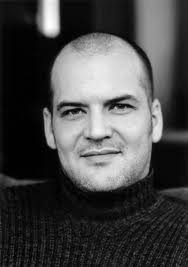Wigmore Hall 12th December 2012
Florian Boesch & Roger Vingoles
Franz Scubert – Winterreise
In my youth – now – rather like the interior of great medieval cathedral lost in time’s mists and today decorated with a graceful restraint we know as good taste – my past stupidities and vanities are befogged by a shameless eliding of facts with fiction – and always – as I prefer to believe – to my own advantage – in my lost youth I stupidly disparaged lieder as a musical art form for the old. And as in all of one’s greatest idiocies there is some truth hidden behind the made-up face of a vainglorious lie. For, as there is wisdom in age, in my older age I too have come to love lieder…not least the orchestral lieder of Berlioz, Strauss, Mahler, Elgar and Britten. But with patient listening I have found myself – with Lady Bracknell in approving of German songs in general- though I still don’t share her disapproval of French songs in particular.
Good song-writing tells a story. It did a thousand years ago; it does today. It’s no mean talent to write the lyrics of a good song. As one who has tried and failed I can readily admire the talent of those who have tried and succeeded – not least amongst my good friends – Gaynor Winstanley for example – whom I met in my University days – writes some belting lyrics to great tunes. I envy her ease.
It’s odd that I should have taken so long to come to lieder or lets call it song since growing up in an Irish household Irish songs were part of my cultural heritage. Indeed in her late seventies my dear mother, Creena, performed the spinning song on stage in her home town of Cashel and was very proud of the fact. I did and do love that song not least because I vividly remember her singing it to me when I was a little boy; not least either because my mother sang throughout my childhood – all sorts songs – she particularly loved the lyrics of the romantic Irish poet Thomas More – whose words inspired a generation of song writers – and helped bring about a renaissance of pride in the native Irish for their bardic heritage. The nationalism of modern Ireland is as rooted in the romance of Celtic myths reworked in the nineteenth century as by the politics of the nation state. But the historic culture disinterred from the romance of failed rebellions by the Revolutionary Fenian Brotherhood in reality is a mere ghost of what had been lost during the brutal genocide visited on Ireland by Oliver Cromwell’s New Model Army. That disaster is one from which Ireland – like the Jews brutalised by discrimination and the peoples of West Africa brutalised by slavery – is still recovering.
This has taken me some way Lieder and from Thursday’s concert. Franz Schubert’s Winterreise sits a-top the mountain of great lieder. Some of the songs are very well known in their own right – the linden tree for example. They are all more or less composed in Schubert’s closing months. Born in 1797 he died of syphilis in 1828. Schubert was often in his last months and weeks in a delirium which was as much a product of mercury poisoning as the dreaded insanity of the tertiary stage which in popular myth famously characterises the last stages of disease’s slow progression. The composer was paid a guilder for each of the songs.- paltry payment as it turned-out for compositions of such wistful, soulful, poignancy.
The Winterrreise was coolly received at Schubert’s first performance of them in Franz von Schober’s rooms. The composer sang them to a speechless, bemused group of friends. Unlike other song cycles of the period – like Schubert’s own Die schöne Müllerin – the Winterreise is devoid of plot. There is no clear narrative journey on which the lyrics and music may take the listener. Instead each song almost seems painfully fragile. It is as if in its lyrical re-imagining recapitulating isolated golden moments dead past only make the dead present more painful. Yet from within that bleak sense of a painful present the wistful sadness of the songs offers a strange solace. and the bleak course of his last months with the death sentence of syphilis hanging over him wring from him one of the most moving and beautiful evocations of life’s spring recalled from the darker days of winter. The Winterreise evokes the sadness of year’s passing, lives passing time’s passing carved into the soul of each of us – but always with that glimmer of hope that always comes with every spring – even the lost springs only remembered in the encircling darkness of every life-cycle’s final winter tale – death.
Last night the mystery of the cycle was perfectly realised. roger Vingoles played so exquisitely it was a times almost painfully beautiful. Florian Boesch interpreted the songs with glorious voice – resonant, darkly subtle, smoothly sung, burnished with many emotional overtones, lyrical, sad and so deeply and touchingly felt – it brought tears readily to the eyes. And what more of any artists might anyone ask?

